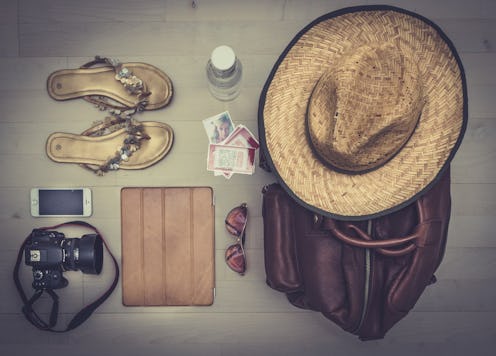Summer is often synonymous with travel, and the one thing many people definitely won't leave home without is their smartphone. However, something you might not consider is how traveling can compromise your digital safety. So, it's important to learn how to can keep your digital information safe during summer travel. While vacations should be a time to unplug and digitally detox, it's not always realistic to think you'll never need to get online while you're away from home.
Cyber security company McAfee conducted a study to better understand the digital habits of travelers, and found that despite the benefits of unplugging, 52 percent of people prefer to stay connected. While it's always fun to post your vacation snaps in real time on social media, doing so can open you up to crafty cyber criminals. If you've ever had your credit card number stolen while traveling — this has happened to me more times than I can count — then you know what I'm talking. But, fear not, there are some easy ways to keep your information secure.
"Our devices are extensions of ourselves that we rely on for more tasks every day,” Gary Davis, chief consumer security evangelist at McAfee said in a press release. “Individuals must exercise caution when using their devices on vacation. By taking basic security precautions and avoiding unnecessary risks, consumers can better protect personal information.”
Here are three ways to stay safe in cyber space while traveling.
1. Only Use Secure WiFi Networks
It can be tempting to save your data while you're on the go by logging onto a free WiFi network — especially if you're traveling internationally and don't want to incur additional charges on your phone.
You're not alone. The study revealed that 31 percent of participants primarily connected using publicly available WiFi, which can open you up to potential security risks; and while 58 percent of participants claimed they know how to determine whether their WiFi is secure, only 49 percent take the time to check their connection. Additionally, 20 percent of people don’t consider the security of their WiFi connection at all (guilty right here) before logging on.
While there is a good chance that nothing bad will happen to you by taking the risk of connecting to a public network, there is still a possibility that your information can be stolen, especially if you have things on your phone like payment and banking apps.
If you have to connect to a public WiFi network, consider using a Virtual Private Network (VPN) like McAfee Safe Connect. A VPN will keep your information private and ensure that data goes straight from your device to where you are connecting, thus bypassing any nefarious cyber crooks.
2. Update Your Devices
The study also noted that people are more addicted to their devices than ever: 38 percent said they could not last even one day without checking their work or personal email, and 37 percent admitted that they could not resist the urge to post to social media while vacationing. What's more is that while most people were willing to leave their laptop at home, 73 percent of people said they could not part with their phones.
I get it. I cannot leave my phone behind, especially if I am traveling alone. Whether it's a false sense of security or not, having my phone makes me feel safe. But, what I didn't realize is that the updating the software and apps on said phone is pretty important. While the constant reminder from your phone to update your software can be super annoying, your phone is just trying to protect you. Kind of like an overprotective parent reminding you to take a sweater with you when you leave the house.
"The first line of defense for your devices is you, so it’s important to take a few precautions to stay safe. Make sure your devices’ operating system and applications are kept updated," McAfee suggested. "Using old versions of software could leave you open to potential security vulnerabilities."
3. Use A Device Locating App
If you've ever misplaced your phone then you know the panic that can ensue. My roommate and I recently both lost our phones a few weeks apart. And, since we keep them on vibrate calling the phones to see if we could hear them ringing in the house was useless.
Thankfully we were able to log onto iCloud via our laptops and use Find My iPhone to locate them. Using a device locating app like this not only shows you where the phone is, but it also makes the device beep so you can follow the sound. In each instance our phones were literally a few feet away buried under something like a book or a blanket.
If you see that your phone is not near you, as in it's been stolen or you left it in an Uber, you can use the app to delete your personal information off of the phone, or even do a factory reset, to protect yourself from cyber criminals.
Vacation is supposed to be a time to relax and enjoy yourself, but being the target of a cyber criminal can quickly throw your trip into turmoil. Take a few extra steps to play it safe this summer; you deserve a real break from the daily grind without the added stress of having to cancel all of your credit cards.
Or, be a real rebel and don't get online while on vacay. Because, the world won't end if you latergram your pictures once you get home instead of posting them in real time.
